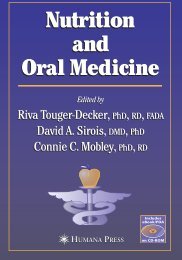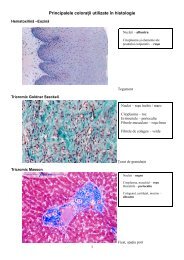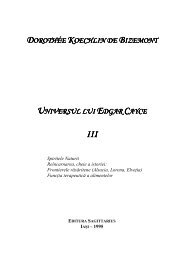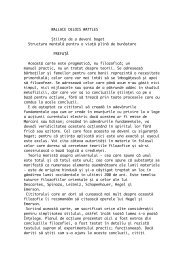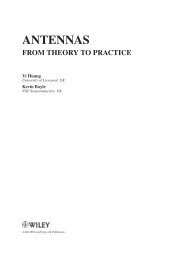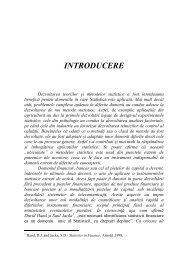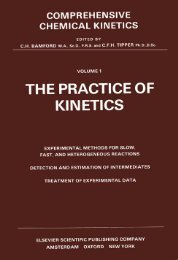Barley for Food and Health: Science, Technology, and Products
Barley for Food and Health: Science, Technology, and Products
Barley for Food and Health: Science, Technology, and Products
Create successful ePaper yourself
Turn your PDF publications into a flip-book with our unique Google optimized e-Paper software.
GLYCEMIC RESPONSE TO CARBOHYDRATE CONSUMPTION 193<br />
The University of Lund researchers subsequently reported some methodology<br />
improvements of the second-meal technique applied to the effect of a low-GI<br />
evening meal on glycemic response to the following morning breakfast meal<br />
(Granfeldt et al. 2006). This study calculated available carbohydrate load as total<br />
carbohydrates minus the indigestible components DF <strong>and</strong> RS. The evening meals<br />
varied in GI <strong>and</strong>/or indigestible carbohydrates, <strong>and</strong> consisted of pasta, barley kernels,<br />
<strong>and</strong> white wheat bread. Serving sizes were adjusted to correspond with the<br />
DF <strong>and</strong> RS content. The test evening meals were found to substantially reduce<br />
the GI <strong>and</strong> insulinemic index of white wheat bread eaten at the subsequent breakfast<br />
meal. Following this study, Nilsson et al. (2007) exp<strong>and</strong>ed the study design<br />
to include four different low-GI evening meals <strong>and</strong> a white bread control. Tests<br />
following the subsequent breakfast meal were exp<strong>and</strong>ed to include measurement<br />
of free fatty acid levels, <strong>and</strong> the markers of colonic fermentation SCFAs in<br />
blood <strong>and</strong> urine <strong>and</strong> expired H 2 . The after-breakfast glucose response was significantly<br />
lower following consumption of barley kernels the previous evening than<br />
after white bread or spaghetti with wheat bran. Breath H 2 excretion <strong>and</strong> plasma<br />
SCFAs were higher at breakfast when subjects had previously consumed barley,<br />
<strong>and</strong> FFAs were lower, in accordance with earlier reports. These results indicate<br />
that colonic fermentation of the specific indigestible carbohydrates present as<br />
well as low-GI features may both influence the improved glucose tolerance at<br />
breakfast. A follow-up study (Nilsson et al. 2007) was conducted to elucidate the<br />
mechanism of improved glucose tolerance at breakfast. Test evening meals consisted<br />
of high-GI white bread (WWB), WWB + barley + barley DF corresponding<br />
to the DF of barley kernels, low-GI spaghetti + barley DF, spaghetti + double<br />
amounts of barley DF (2*DF), spaghetti + oat DF, or whole-grain barley flour<br />
porridge. The rationale of the treatment containing spaghetti + double the barley<br />
DF (2*DF) was to mimic the DF content of the whole barley kernels in the earlier<br />
studies. At breakfast the morning after the test meals, blood glucose, insulin,<br />
SCFAs, FFAs <strong>and</strong> breath H 2 were measured. The most effective evening meal<br />
<strong>for</strong> lowering glucose response was spaghetti + 2*DF. This meal also resulted in<br />
the highest breath H 2 excretion. The glucose incremental AUC after breakfast<br />
was correlated positively with fasting FFAs, suggesting colonic fermentation as<br />
a modulator of glucose tolerance through a mechanism leading to suppressed<br />
FFA levels. This study demonstrated that the low GI of a food per se is not<br />
attributable to slow digestion <strong>and</strong> absorption of sufficient magnitude to induce<br />
overnight benefits. These researchers suggested the possibility that the presence<br />
of abundant fermentable fiber in a food may be a more reliable indicator of<br />
potential low glycemic responses. More recently (Nilsson et al. 2008), this group<br />
repeated the study using both boiled barley kernels <strong>and</strong> WWB + barley fiber + RS<br />
at an evening meal. At breakfast, glucose response was negatively correlated with<br />
colonic fermentation <strong>and</strong> GLP-1 <strong>and</strong> positively correlated with fasting FFA. The<br />
levels of the pro-inflammatory marker IL-6 were lower at breakfast, <strong>and</strong> fasting<br />
adiponectin was higher after the previous barley kernel evening meals. These<br />
results support their hypothesis of high fermentable fiber as the definitive factor<br />
in physiological responses in carbohydrate metabolism.







